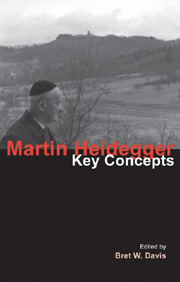Book contents
- Frontmatter
- Contents
- Contributors
- Acknowledgements
- Abbreviations
- Introduction: key concepts in Heidegger's thinking of being
- 1 Hermeneutics of facticity
- 2 Phenomenology: Heidegger after Husserl and the Greeks
- 3 Dasein as being-in-the-world
- 4 Care and authenticity
- 5 Being and time
- 6 The turn
- 7 Heidegger, National Socialism and the German People
- 8 Truth as alētheia and the clearing of beyng
- 9 The work of art
- 10 Ereignis: the event of appropriation
- 11 The history of being
- 12 Will and Gelassenheit
- 13 Ge-stell: enframing as the essence of technology
- 14 Language and poetry
- 15 The fourfold
- 16 Ontotheology and the question of god(s)
- 17 Heidegger on Christianity and divinity: a chronological compendium
- Chronology of Heidegger's life
- Bibliography
- Index
11 - The history of being
- Frontmatter
- Contents
- Contributors
- Acknowledgements
- Abbreviations
- Introduction: key concepts in Heidegger's thinking of being
- 1 Hermeneutics of facticity
- 2 Phenomenology: Heidegger after Husserl and the Greeks
- 3 Dasein as being-in-the-world
- 4 Care and authenticity
- 5 Being and time
- 6 The turn
- 7 Heidegger, National Socialism and the German People
- 8 Truth as alētheia and the clearing of beyng
- 9 The work of art
- 10 Ereignis: the event of appropriation
- 11 The history of being
- 12 Will and Gelassenheit
- 13 Ge-stell: enframing as the essence of technology
- 14 Language and poetry
- 15 The fourfold
- 16 Ontotheology and the question of god(s)
- 17 Heidegger on Christianity and divinity: a chronological compendium
- Chronology of Heidegger's life
- Bibliography
- Index
Summary
From history to Ereignis
The unfolding of the fullness of being in its transformations looks at first like a history of being. But being has no history in the way a city or a people has a history. What is historical about the history of being is to be determined clearly and solely through the way being happens, which means … from out of the way there is/it gives being [Es Sein gibt].
(TB 8 = ZSD 7–8, trans. mod.)The short lecture “Time and Being”, in which this dense passage is found, contains Heidegger's final attempt to address in a sustained and explicit manner a central topic of his thinking. Yet in this passage we find him questioning precisely the historical character of the history of being. On the face of it, this is indeed an odd question: what are we to make of a history that is not historical in the way that all other histories are considered historical? In its unique way of being historical, the history of being remains unlike every other history and breaks somehow with the entire class of histories.
Heidegger is clear. If we want to achieve what he calls here a determination of the uniquely historical character of the history of being, we must attend to the way in which being happens in its utter singularity; and this means, he says, as a giving or a sending, or even as a “destiny”.
- Type
- Chapter
- Information
- Martin HeideggerKey Concepts, pp. 155 - 167Publisher: Acumen PublishingPrint publication year: 2009
- 1
- Cited by

